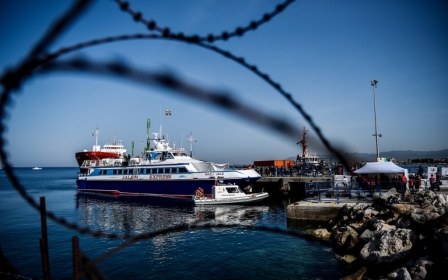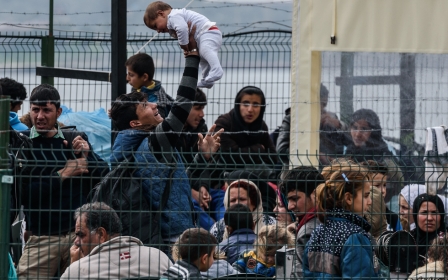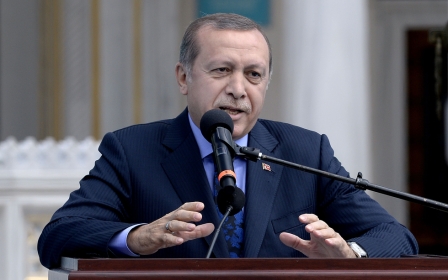Erdogan warns Turkey will ditch migrant deal if EU breaks its promises

Turkish President Recep Tayyip Erdogan on Thursday warned the European Union that Ankara will not implement a key deal on reducing the flow of migrants if Brussels fails to fulfill its side of the bargain.
Under the deal, Ankara will take back all migrants and refugees who cross the Aegean Sea to enter Greece illegally. In return, Europe will take in thousands of Syrian refugees directly from Turkey and reward it with money, visa-free travel and progress in its EU membership negotiations, Reuters said.
"There are precise conditions. If the European Union does not take the necessary steps, then Turkey will not implement the agreement," Erdogan said in a speech at his presidential palace in Ankara.
The 18 March accord sets out measures for reducing Europe's worst migration crisis since World War II, and in return, Turkey is to receive visa-free travel for its citizens to Europe at the latest by June. Turkey is also to receive a total of $6.6bn in financial aid up to the end of 2018 for the 2.7 million Syrian refugees it is hosting.
Marc Pierini, visiting scholar at Carnegie Europe, described the visa-free travel as one of the "biggest benefits for Turkey" in the migrant deal.
He said Turkey still has to fulfill 72 conditions on its side to gain visa-free travel to Europe’s passport-free Schengen zone and that the move would also have to be approved by EU interior ministers.
Turkey’s process to join EU
Turkey's long-stalled accession process to join the EU is also supposed to be re-energised under the deal. But Pierini said there were many conditions still to be fulfilled here.
"The worst reading of the EU-Turkey deal would be to imagine that Turkey is about to get a 'discount' on EU membership conditions just because of the refugees," he said.
Erdogan argued that Turkey deserved something in return for its commitment to Syrian refugees, on whom it has spent some $10 billion since the Syrian conflict began in 2011.
"Some 3 million people are being fed on our budget," he said.
"There have been promises, but nothing has come for the moment," he said.
Meanwhile, the Vatican confirmed that the pope would next week make a brief, unprecedented trip to the Greek island of Lesbos, where thousands of migrants are facing deportation to Turkey under the deal.
Pope to visit Lesbos
Pope Francis will visit Lesbos on 16 April to show his support for the migrants, the Vatican said.
The Greek government on Thursday started to move some migrants from the Moria camp on Lesbos, where 3,000 are crammed, to the open camp of Kara Tepe, also on the island, an official said, insisting it was not linked to the pope's visit.
The first transfer of more than 200 migrants from the Greek islands of Lesbos and Chios to Turkey took place on Monday. But since then, there have been no more. The process has been stalled by a last-minute flurry of asylum applications by migrants desperate to avoid expulsion.
Nikos Xydakis, Greece's junior foreign minister for European affairs, said it would take "at least two weeks" to process the first batch of asylum applications.
German Chancellor Angela Merkel, whose country took in 1.1 million asylum seekers last year, delivered a message of optimism Thursday regarding the migrant crisis.
"I am very happy today, however, I know that we have not yet completed all the tasks before us," she told reporters during a meeting with French counterpart Francois Hollande in eastern France.
Under the pact with the EU, Turkey has agreed to take back migrants who arrived in Greece in illegal crossings of the Aegean Sea after 20 March.
For every Syrian refugee sent back to Turkey, one Syrian is supposed to be resettled in Europe.
The deal has caused huge controversy, with rights groups including Amnesty International claiming Turkey could not be considered a "safe country" for the return of refugees.
A Spanish far-left party filed a court complaint Thursday against acting Prime Minister Mariano Rajoy for "crimes against humanity" over his support of the accord.
The Izquierda Unida party accused Rajoy and other European leaders of "having agreed with Turkish authorities to forcibly deport and transfer an unspecified number of people from EU territory".
According to lawyers for IU, this represents a crime against humanity under the Spanish penal code.
New MEE newsletter: Jerusalem Dispatch
Sign up to get the latest insights and analysis on Israel-Palestine, alongside Turkey Unpacked and other MEE newsletters
Middle East Eye delivers independent and unrivalled coverage and analysis of the Middle East, North Africa and beyond. To learn more about republishing this content and the associated fees, please fill out this form. More about MEE can be found here.




